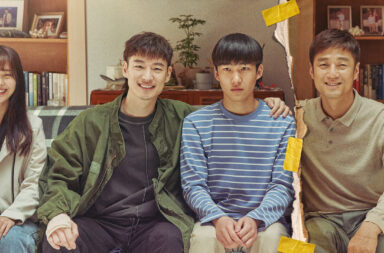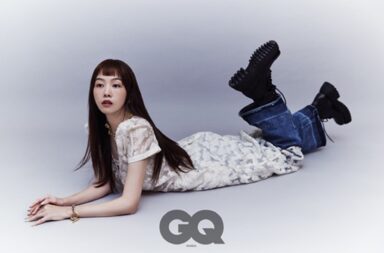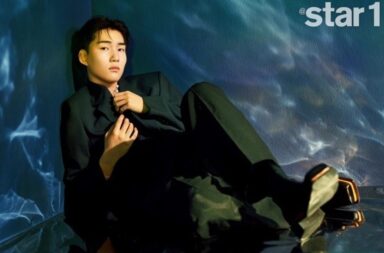
Racket Boys, a slice-of-life youth sports drama penned by Jung Bo-hun (of Prison Playbook fame) premiered on the 31st of May and has become known as a feel-good and heart-felt comedy — a comforting bright spot to tide through these dark days.
This review contains spoilers.
While Racket Boys is really more of an ensemble drama, at its heart is Yoon Hae-kang, played by the talented Tang Joon-sang, fresh off his breakthrough role in Move To Heaven. A former badminton prodigy, he turned to baseball after he was “betrayed” by his badminton teammates and excelled there.
However, his baseball dreams are cut short by his family’s financial issues, and the family (comprising little sister Hae-in, played by the adorable Ahn Se-bin, and father Yoon Hyeon-jong, played by Kim Sang-kyung) move to Ttangkkeut village in Haenam after Hyeon-jong takes a badminton coaching job there. A boarding house type of situation quickly emerges as three other members of Haenam Seo Middle School’s badminton team, as well as two members of Haenam Jeil Girls’ Middle School’s badminton team, move in together with Hyeon-jong and his family.
It’s me, the one and only Yoon Hae-kang!
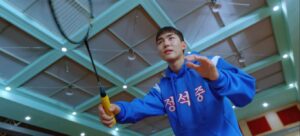
Right off the bat, viewers are introduced to Hae-kang’s cocky trademark line, but we also get to see the multiple facets of Hae-kang’s colourful personality. He is arrogant, but his confidence is not baseless, because he is hardworking and extremely good at what he does. He whines, but he also actively avoids burdening his father, or making his parents feel sorry for not having enough money to fund his baseball dreams. In true adolescent form, he can go from being sensitive and mature to being petty and childish in a split second — Hae-kang is definitely one of the most relatable K-drama leads to grace our screens in recent history.
Even at a young age, Hae-kang took care of his father’s feelings, as revealed in a heartbreaking scene in Episode 4. When his former badminton teammates threw out the burgers that Hyun-jong had bought for the team and badmouthed Hyun-jong in the washroom because of his “cheapness”, Hae-kang picked the burgers from the trash while lying to Hyun-jong that his teammates enjoyed them. This scene displayed Hae-kang’s maturity, but also gave an insight into why Hae-kang quit badminton in the first place, and why he treasures his present team so much now. He may have had his guard up at the start, but his lovable teammates definitely burrowed their way into his heart.
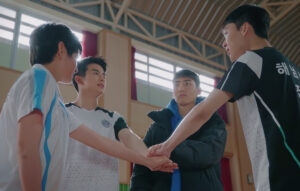
As teammates, classmates, roommates and most importantly gaming buddies, this team does life together, and their group scenes never fail to put a smile on my face.
Comprising captain Bang Yoon-dam (played by the charming Son Sang-yeon), Na Woo-chan (Choi Hyun-wook), mascot Lee Yong-tae (Kim Kang-hoon) and class nerd/master strategist Jeong In-sol (Kim Min-gi), this team works wonderfully together, and is a great underdog team to root for. They play on each other’s strengths, they genuinely enjoy each other’s company and they love each other as friends, regardless of the rivalry they might have while playing competitive badminton.
For instance, Woo-chan and Yong-tae appear to face a rift when they have a face-off to determine who will be the last member to represent the team in an upcoming competition. When Yong-tae eventually wins, he is convinced that Woo-chan’s resultant bad mood is caused by him, and is extremely apologetic. However, it turns out that Woo-chan had never begrudged Yong-tae his success, and it was heartwarming to see that their friendship remains untainted by the competition that surrounds them.
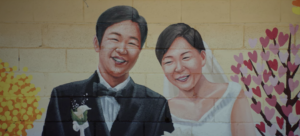
Friendship is also a common theme for the people of Ttangkkeut village. The unique and wildly entertaining cast of characters within this village spice up each episode, and their interactions are both hilarious and touching.
In particular, the blossoming relationship between the city couple (Jung Min-seong and Park Hyo-joo) and the grandma (Cha Mi-kyung) has been great to witness over the past eight episodes. They started off on the wrong foot, with the couple misunderstanding Oh Mae Grandma’s way of speaking and accidentally running over her cabbages with their car.
However, with the quiet acts of kindness that Oh Mae Grandma shows (i.e leaving fresh kimchi at their doorstep, saving their crops in the midst of a thunderstorm etc) the couple, in particular the city wife, realises how sweet of a neighbour Oh Mae Grandma actually is, underneath her gruff ways. This prompts the city wife, an artist, to paint a beautiful mural on Oh Mae Grandma’s walls — one that depicts her beloved family, as well as the wedding picture she never got to take.
Without a doubt, this was my favourite scene in the whole drama so far, and it is amazing to look back and realise how much these friends have progressed in just a few episodes. It is a hopeful depiction that change is not necessarily bad, even if it takes some getting used to – with greater mutual understanding and simple kindness, new gems and relationships can be formed along the way.
Another big theme that is explored by Racket Boys is that of parenthood and parent-child relationships. Parental love comes in many forms — some are more overt, like Yoon-dam’s parents who proudly display his picture at their bakery, while others are more subtle, like Woo-chan’s military father who secretly goes to watch the team’s matches.
Children might not always appreciate what their parents do for them, as in the case of Yong-tae, who hates the bitter herbal tonics his father prepares for him, but at the end of the day, they know that it’s for their own good. It’s to a credit of this show that there are no real villains in the main cast (although a few have popped up as cameos along the way) — each person is realistically portrayed, with strengths and flaws that make them utterly human. The conflicts feel organic, and their resolutions true-to-life.
The theme of parenthood extends beyond biological relations, as Hyun-jong and Ra Yeong-ja, Hae-kang’s parents, act as parent figures to their respective badminton teams. Yeong-ja, who Hae-kang reunites with when the family lives together in Ttangkkeut village, is better known as “Ranos” for her no-nonsense ways as a badminton coach. Perfectly played by Oh Na-ra, Yeong-ja’s devotion to Haenam Jeil Girls’ Middle School’s badminton team, as well as her family, is extremely admirable, and she acts as a great role model for many of our characters.
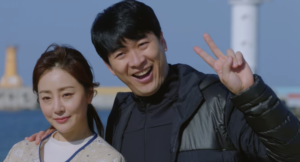
In Episode 4, a great contrast is drawn between Yeong-ja’s and Hyeon-jong’s coaching styles. While Yeong-ja visits the competition venue and accommodation hours ahead of time to make sure that her athletes are in the best condition, Hyeon-jong gets drunk the night before the competition and ends up causing his team to be disqualified because they were late. Thankfully, he learns from this experience, and makes the effort to be a better coach to this team. His continual growth and the increased responsibility he takes on for his team is gratifying to watch as the show progresses, and it peaks in Episode 8, when his efforts to correct Yoon-dam’s rigid swing pays off, enabling Yoon-dam to enter the national youth team.
A running gag throughout the show centres on the way the teenagers rarely pay attention to Hyeon-jong’s instructions/scoldings, but Yeong-ja immediately commandeers obedience. Viewers soon come to realise, however, that the respect Yeong-ja receives is built on the immense dedication she has towards her students, and not just because of her “scary” personality alone.
Yeong-ja’s professional success did not come without its sacrifices, especially in the familial domain. Hae-kang forces her to come to terms with this reality, because he largely grew up without his mother and wants to save his younger sister from the same fate. Even though Yeong-ja sacrificed her Olympic dreams to be a mother, her absence from the lives of her children has its consequences as well. Racket Boys deals with this issue in a touching and delicate manner, ultimately driving home the message that both parent and child need to have more empathy for each other, and to think from each other’s perspectives. It is in these moments that Racket Boys reveals itself to be much more than just a sports underdog type of story. There are lessons here for everyone, no matter your age or life circumstance.
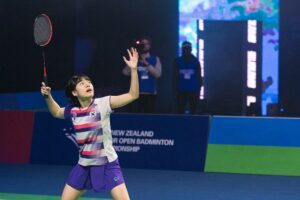
Unfortunately, while this drama shines with its slice-to-life format and portrayal of interpersonal relationships, it definitely falters in actual badminton playing. Not many badminton sequences are actually shown, and in almost every match, viewers get to see only a short rally before the match is quickly won with a dramatic smash shot. I’m not a badminton expert, but other viewers have pointed out how the team seems to constantly be working on doing simple exercises and building stamina alone, as opposed to working on improving actual techniques.
Racket Boys also recently drew controversy because of the way Indonesia, a powerhouse in the sport, was portrayed as unfriendly towards international athletes in Episode Five. Han Se-yoon (Lee Jae-in), a member of Yeong-ja’s badminton team as well as a national junior player, went to Indonesia for a competition which she eventually won. From giving Se-yoon poor accommodation to booing at her during the match, Indonesians were cast in a very negative light, prompting Indonesian fans to protest against this portrayal online.
Given that this plot line was completely unnecessary to the story, it is unfortunate that the show creators chose to include it, without regard of the actual international badminton scene, or how it could be received by international viewers. Hopefully similar issues will not crop up in the future, and that international competition scenes in particular, will be dealt with more sensitivity.
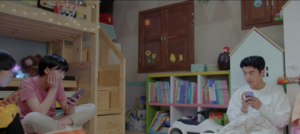
Beyond these problematic issues, Racket Boys is an extremely enjoyable watch. From the heart-fluttering relationships growing between Yoon-dam and Han-sol (another member of Haenam Jeil Girls’ Middle School’s badminton team) as well as Hae-kang and Se-yoon, to the gradual rise of the underdog badminton team, there is so much to look forward to in the second half of this drama.
(South China Morning Post. Yahoo! News. Youtube. Images via SBS.)
